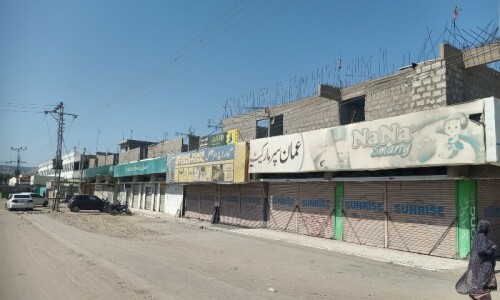ISLAMABAD: Despite protests from the Ministry of Planning, the Ministry of Finance has decided to keep the lid on federal financing of development and recurrent expenditures through back-loaded releases of funds to meet the IMF’s primary surplus targets at any cost.
According to fresh notifications from the Ministry of Finance, the Ministry of Planning, Development and Special Initiatives shall authorise only 15 per cent of funds for approved development projects in the first quarter (July-September) of the current fiscal year.
This will be followed by 20pc in the second quarter (October-December), 25pc in the third quarter (January-March), and 40pc in the fourth quarter (April-June).
Under the $7 billion new bailout package approved on Saturday, the government has promised the IMF that it would ensure “underlying general government primary surplus of 1pc of GDP (2pc in headline terms)”, according to an IMF announcement.
Finance ministry makes drastic changes to PSDP disbursement, current expenses
The PTI government shortened the budget release process for speedy disbursements and implemented a mechanism that made half of the total annual allocations available to development projects in the first half of the fiscal year.
This entailed 20pc disbursements in the first quarter, followed by 30pc each in the second and third quarters, and the remaining 20pc in the last quarter.
Before PTI, the practice was to release 40pc of development funds in the first six months — 20pc each in the first and second quarters — and the remaining 60pc in the second half of a fiscal year, at the rate of 30pc in each quarter.
It is generally viewed in the planning division that back-loaded disbursements affect the pace of project implementation and smaller releases slow down development schemes in the first part of the year and lead to cost overruns.
Therefore, a front-loaded disbursement mechanism was put in place to encourage advance releases to the executing agencies to utilise funds appropriately within the required period.
Until a few years ago, the Planning Commission used to authorise funds to development schemes based on cash plans of the executing agencies.
However, the Ministry of Finance used to withhold sizeable funds on the premise of “ways and means clearance” to slow down disbursements for development and meet urgent requirements of current expenditure or other obligations.
It was one of the key reasons for project delays and their cost overruns.
Due to continuous tensions between the finance and planning ministries, the disbursement mechanism was changed again in 2022 and the planning division notified that development funds allocated in the budget would be released at the rate of 20pc in first quarter, followed by 30pc each in second and third quarters, and the remaining 20pc in the last quarter of each fiscal year.
However, the Ministry of Finance changed the policy again last year to ensure the primary cash surplus target committed to the IMF, leading to a more than Rs230bn cut in development expenditures to about Rs727bn at the end of the 2023-24 fiscal year compared to the budgetary allocation of Rs950bn.
The Ministry of Planning protested in writing to the Annual Plan Coordination Committee and National Economic Council early last month over the finance ministry’s decision.
Last week, the Ministry of Finance issued fresh instructions with tight control on disbursement to keep space for expenditure cuts in May-June in case of slippages on the revenue collection front.
On the other hand, the recurrent budget to divisions, attached departments, subordinate and other offices including autonomous bodies, authorities and commissions, etc. shall be released during the current fiscal year at the rate of 20pc for the first quarter, 25pc each in second and third quarters and 30pc for the fourth quarter.
Published in Dawn, July 15th, 2024













































